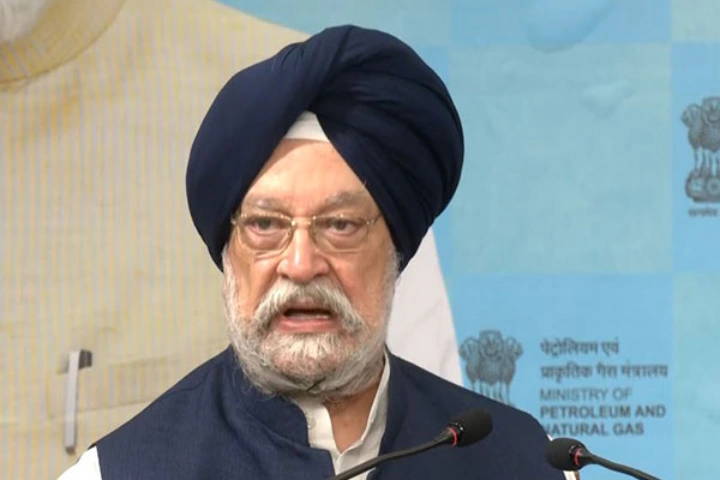

Union Minister Hardeep Puri (Photo: ANI)
Stating that India’s policy was ‘Nation First’ and the consumer was ‘paramount’, Union Minister Hardeep Singh Puri said that the Centre was able to keep oil prices from shooting up despite global turbulence amid the Russia-Ukraine conflict and drone attacks on merchant ships in the Red Sea.
The Union Minister for Petroleum and Natural Gas said 85 per cent of India’s crude requirements are met by imports, with the price of crude in the international market being the benchmark.
Addressing a press conference in the national capital on Saturday, Puri said, “If you accept that (global issues), you have to deal with the price of crude in the international market and the price at which it is made available. What happened in the last few years?”
The Union Minister elaborated on how the ‘Russia-Ukraine war’ impacted the crude oil supply, but India was able to manage its supply by diversifying its source and increasing the purchase from Russia despite fear of sanctions.
“We know how the Russia-Ukraine war erupted. Russia produces 11-13 million barrels per day. One way was to stop buying crude oil from Russia, but it would have brought down the availability and we couldn’t have disrupted oil supply to the public. In that case, the prices would have shot up to USD 138…there were talks of sanctions,” Puri said.
“At that stage, we were buying only 0.2 per cent crude oil from Russia. But, we had to confront and navigate the situation. We have been diversifying our supply and increased our purchases from Russia. Our policy is that from wherever we will get the crude oil as per our requirements, we will buy it, and it is a totally transparent system. When other countries saw this, they also gave us discounts. Our policy is ‘nation first’ and the consumer is paramount.”
Puri said that even though OPEC+ — a bloc of 23 oil-exporting countries including OPEC –reduced its crude oil production, oil prices didn’t rise in India.
“Even the producing countries are taking steps to curtail production. OPEC+ reduced its production by 5 million barrels. Despite things standing as thus, the prices (in India) didn’t go up, which means the market absorbed it,” he said.
The Union Minister also described how the Red Sea crisis impacts global oil supply while affirming that India will be able to navigate the situation while maintaining availability, affordability and sustainability.
“Due to the situation in the Red Sea, we have to track all the updates. Even though we are not directly concerned with shipping costs, our suppliers are. In spite of all that, I am very confident that the situation as it is and as it is likely to evolve has a lot of space to navigate in the interest of our consumers to ensure availability, which has not been affected at all in the last few years, affordability, which you have seen the evidence of and transition to green fuels, and sustainability,” Puri added.
Prime Minister Narendra Modi interacted with members of the Indian diaspora here on Wednesday as…
The city of Hamburg in Germany is set to host the 11th edition of India…
The International Atomic Energy Agency (IAEA) has confirmed that two Iranian centrifuge production facilities, TESA…
The human rights department of the Baloch National Movement (BNM), Paank, has strongly condemned the…
In a major boost to India's coastal defence capabilities, the Indian Navy on Wednesday commissioned…
Volker Turk, the UN High Commissioner for Human Rights, on June 17 expressed concern over…